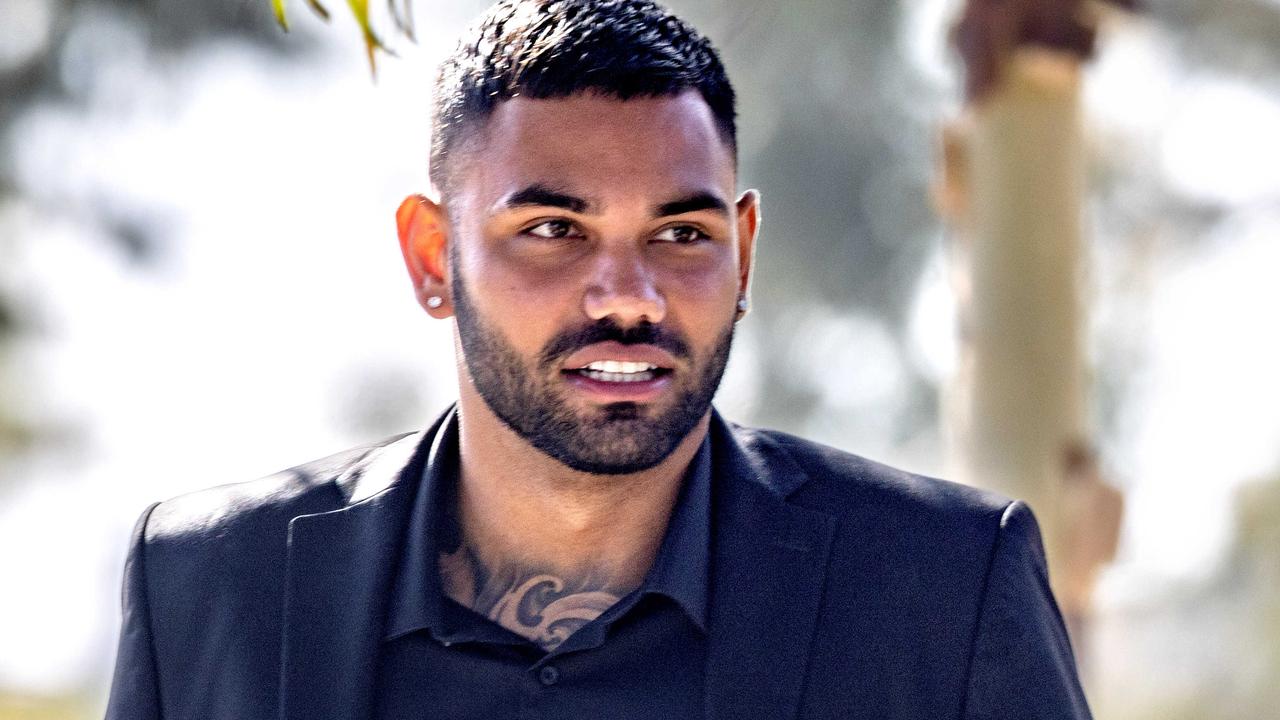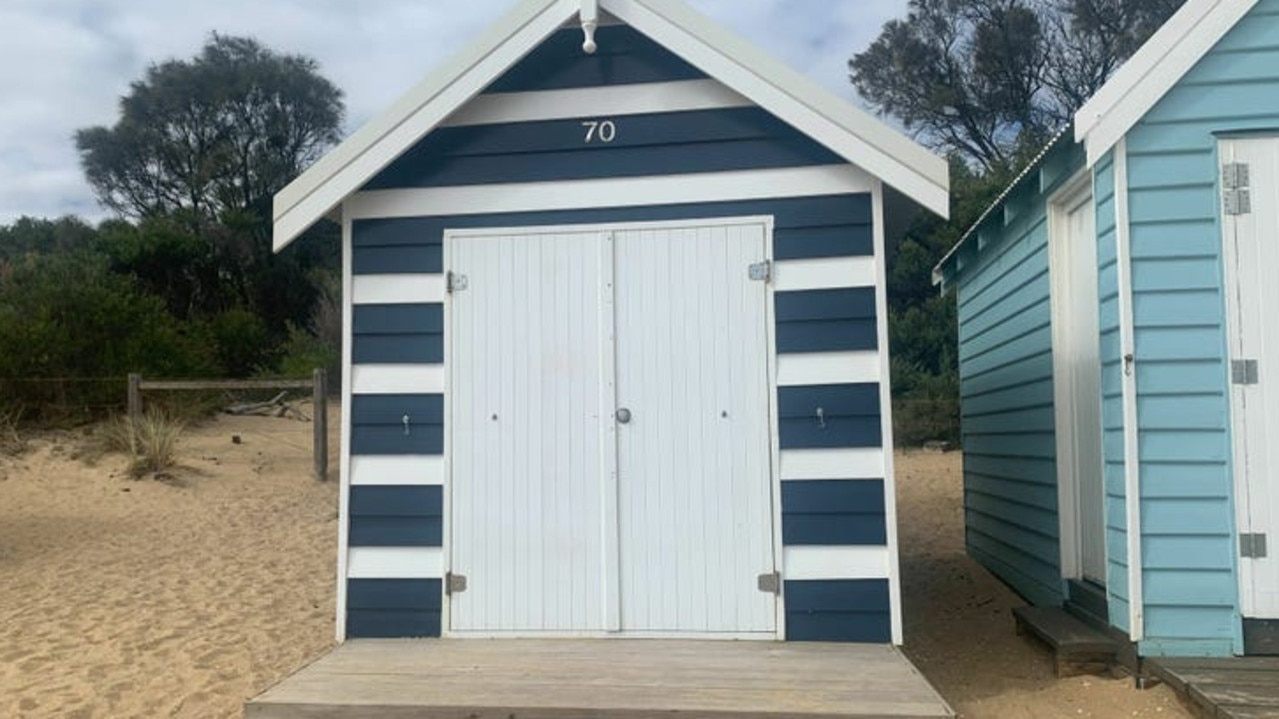Thousands to protest against women’s violence and demand better crisis services
Thousands of Victorians will march this weekend to protest violence against women and demand better resources for domestic and family violence victims.
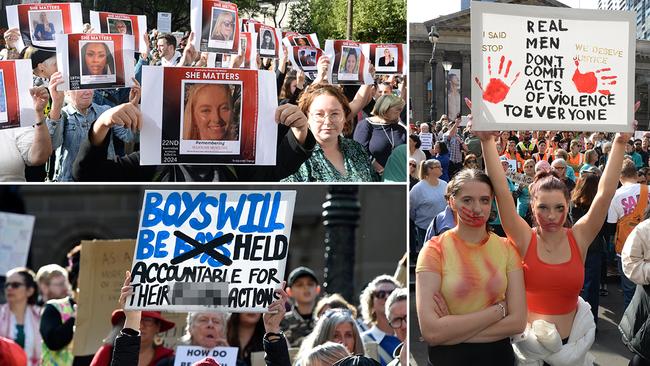
Leader
Don't miss out on the headlines from Leader . Followed categories will be added to My News.
Thousands of Victorians will gather across the state this weekend to demand an end to domestic violence as shocking statistics show the number of women fleeing violent homes has soared in the past decade.
Rallies organised by Indigenous non-for-profit organisation “What were you wearing?” will be held nationwide from Saturday, including in Melbourne, Bendigo, Geelong and Ballarat.
Recent crime statistics agency data revealed police responded to nearly 96,000 family violence incidents in the past year.
Indigenous women and children are up to 34 times more likely to hospitalised due to family violence than non-Indigenous women and six times more likely to die as a result of family violence.
Data by the Department of Families, Fairness and Housing revealed since 2015 the number of women who fled domestic and family violence and sought long term housing increased by 135 per cent.
The top 16 LGAs with the highest rate of family violence incidents per 100,000 people this past year were all in regional Victoria.
East Gippsland had the highest rate, at 3,914.20 family violence incidents per 100,000.
It can also be revealed that more than 50,000 women and children face homelessness each year, mostly due to domestic violence.
So far this year 54 Australian women have been murdered, including nine Victorians, which equates to about one death every four days.
A “Stay Stop to gendered violence” event will also be held in Shepparton on Saturday, which has the ninth highest rate of family incidents per 100,000 people in the state.
Rally organiser and Greater Shepparton deputy mayor Sam Spinks said the event was about “showing solidarity and demanding action”.
“We have created this rally as a way for the women and the men of the Goulburn Valley to come together in solidarity with those who have lost their lives and who are victim survivors,” she said.
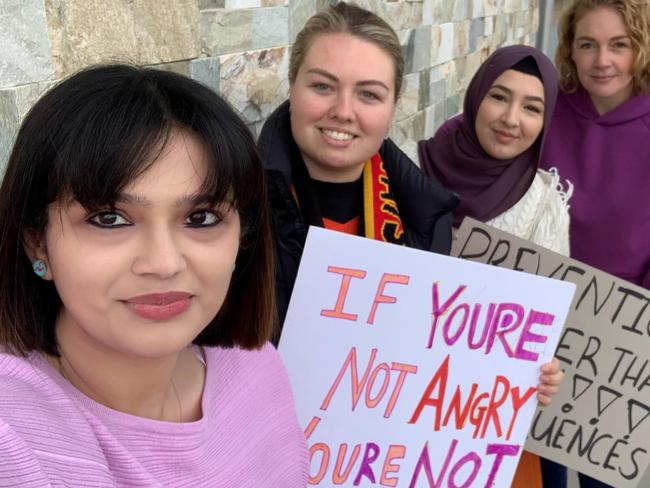
Mornington Peninsula in Melbourne’s southeast had nearly 700 women enter homeless services as a result of domestic family violence.
Mornington Peninsula councillor Sarah Race decided to act.
She reached out to Women’s Community Shelters, an organisation which has established 11 women’s shelters and activated 63 transitional homes in NSW, with the aim of bringing them to Victoria and the Peninsula.
Ms Race said the Peninsula model could act as the blueprint for the rest of the state.
“I didn’t realise how big an issue family violence was here in the Mornington Peninsula … realising that we didn’t have any crisis accommodation really broke me in a way,” she said.
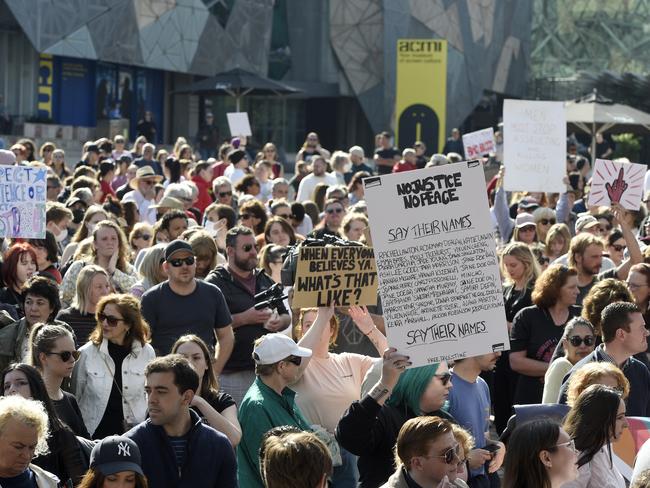
The Mornington shelter hoped to provide crisis accommodation for up to 70 clients (30 women and 40 children) within its first year.
WCS chief executive Annabelle Daniel OAM said there was a “great need” for more services in Victoria.
“When women and children go into motels because there’s no other safe and supported crisis accommodation their outcomes aren’t good,” she said.
“We work with women and kids to find the next step of affordable housing.”
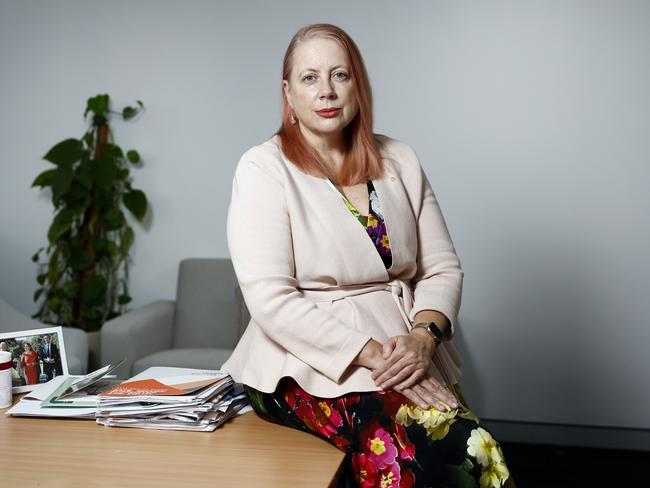
‘You need to leave tonight’: Victims share their story
Jess* (not her real name) was at home in Bendigo last year when she got a call from her lawyer.
She was in the middle of a vicious family court battle against a violent ex-partner who had contested an intervention order made against him.
He once pulled a knife on her while in the car and had a history of drug abuse, but the worst was yet to come.
“My lawyer rang me and said I had to get out of Bendigo that night for my own safety,” she told the Herald Sun.
Jess’ legal team received subpoenaed information he was on bail for pouring petrol on his new girlfriend, which also prompted Bendigo’s family violence prevention service to immediately upgrade Jess’ risk status from “moderate” to “severe”.
But, as thousands of women in similar situations have discovered, a shortage of crisis accommodation options left Jess stranded; fearful her violent ex-partner could rock up at her door at any moment.
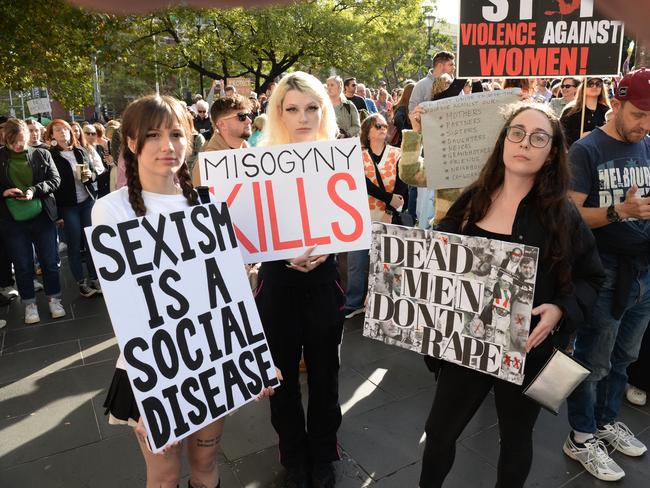
With nowhere to go — aside from hopping around motels — Jess was told to add cameras, cover up her car and not leave the house; a near impossible task for a mother with a young child.
“I literally became a prisoner in my own home,” she said.
“One night I tried to work out if I could move interstate but there was a big risk that I would end up homeless.
“You feel hopeless, you feel like there’s no hope of getting out.”
The realisation she would be forced to leave the community she and her daughter had fallen in love with and relied upon was equally as heartbreaking.
“We had good people around us as part of our family and we’ve had to leave that behind,” she said.
The top 16 LGAs with the highest rate of family incidents per 100,000 people this past year were all in regional Victoria.
Violence in a regional household is something Shepparton woman Lutfiye Kavci unfortunately knows all too well, surviving a sickening stabbing attack at the hands of her husband.
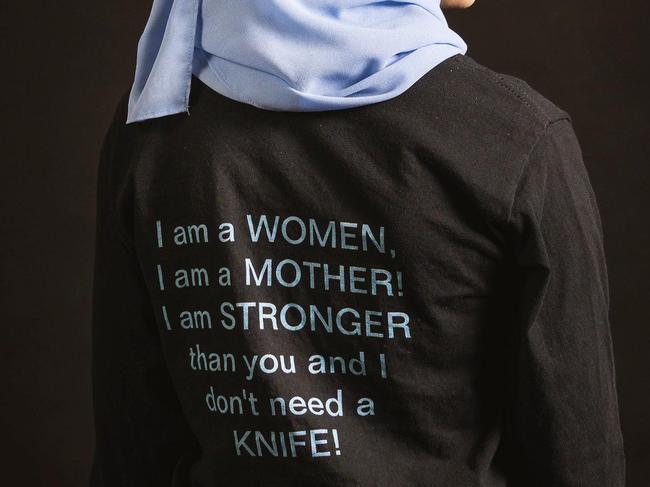
Ms Kavci met Mahmut Cigercioglu through a family friend overseas in late 2019 and married in early 2020.
But their relationship quickly turned violent, with Cigercioglu a heavy drinker, gambler and abuser.
In one incident, Cigercioglu attempted to stab Ms Kavci’s family members at an Eid al-Fitr function — which celebrates the end of Ramadan — after he became enraged that her sister had held their son.
Ms Kavci ended their relationship two days later.
On October 15, 2021, she was brutally stabbed by Cigercioglu after he tried to convince her to resume their relationship and she rejected the idea.
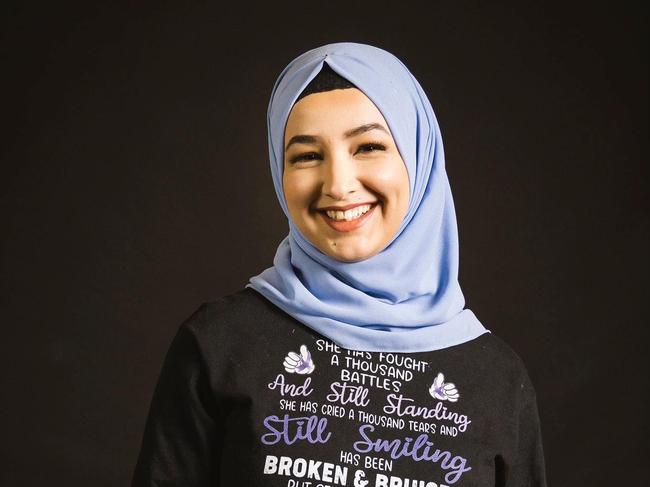
She survived, she said, because the knife he used broke during the attack.
“He stabbed my hands twice, and continued up my arm, my chest and into my abdomen,” she said
“He continued stabbing me until the knife broke.”
She suffered a collapsed lung, two perforations to her liver and received 19 units of blood.
In December 2023, Cigercioglu was sentenced to 15 years jail by the Supreme Court of Victoria, over the attack and told he would likely to deported back to Turkey when his sentence expired.
Ms Kavci, who now works with the Victims of Crime Commissioner advisory group, has not been able to secure a place to rent, despite having a stable income, job and “a good amount of savings”.
She said the biggest issue for survivors, especially in regional areas, was battling the housing problem.
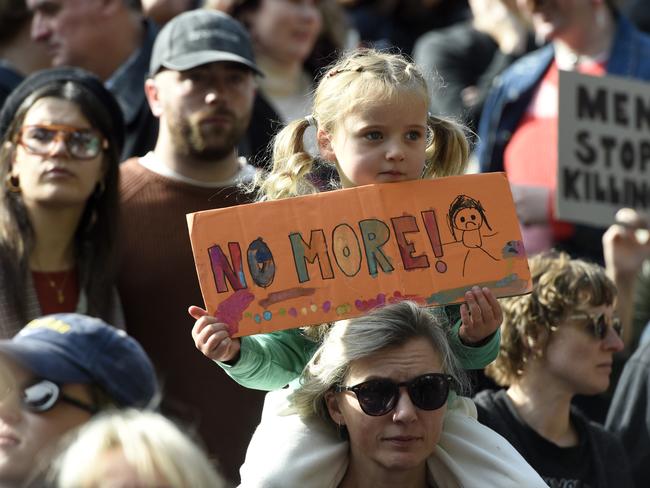
‘Enough is enough’: Victorians to hit the streets
On Sunday, Cobram woman Ashleigh Ladgrove will lead one of many powerful rallies across the country, demanding an end to violence against women.
Ms Ladgrove, who “grew up in a family violence home” from a young age, said it was in her teenage years when she came to terms with her abusive upbringing at the hands of her stepfather.
“As a child you think that it is your fault,” she said.
Her mother and siblings were also abused, with Ms Ladgrove’s eldest sister “hiding” the siblings under her bed to get them away from the violence.
It was only when she opened up as a 13-year-old about the abuse to a friend, who promptly responded “that’s sexual abuse”.
She reported it to a counsellor and attended a session with her mother, with the counsellor urging Ms Ladgrove to notify police.
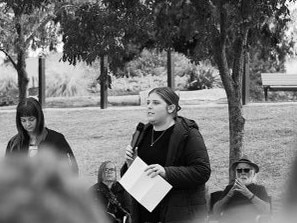
But to her shock, her mother looked at her and said “look what you have done”.
“I lost all empowerment in that moment,” she said.
There were a total of six victims abused by her stepfather, who would eventually be jailed for 12 years.
Sadly, Ms Ladgrove’s mother died a few years ago.
She said the ordeal “destroyed” the family and that her siblings remained at different stages in their grief.
She still suffers from nightmares about her abusive childhood.
Now back in the Cobram area after an eight-year hiatus, Ms Ladgrove is passionate about promoting awareness around family violence, and will lead a rally at Cobram on Sunday.
Ms Ladgrove also led a rally on April 28 at the same venue – Federation Park – in the wake of local woman Emma Bates’ death at the alleged hands of John Torney.
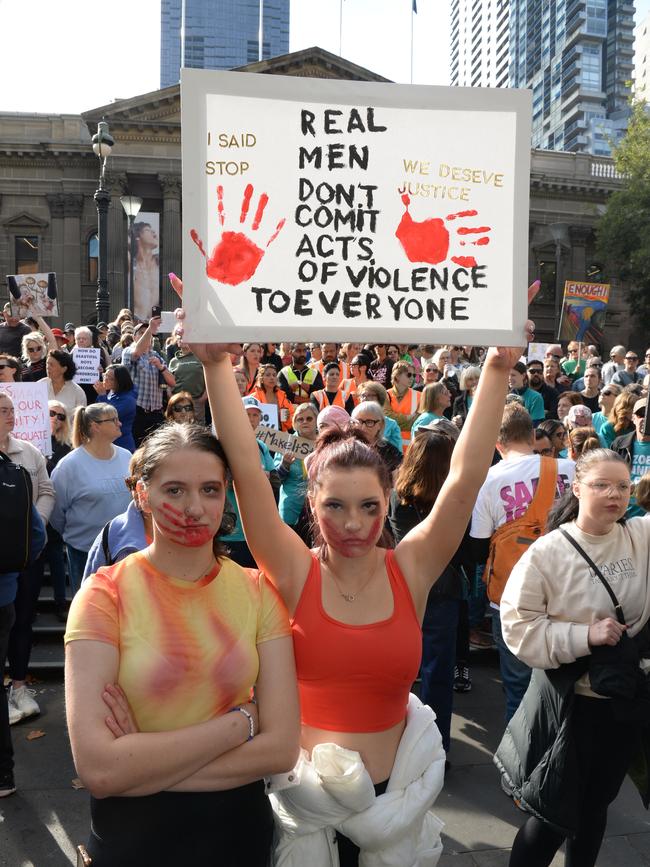
Likewise, breaking free of the tortured limbo domestic violence survivors endure while looking for a new home, Jess and her daughter managed escaped Bendigo and now reside in bayside Melbourne.
She runs a Facebook group for women and is in regular contact with survivors across the country looking to escape abusive relationships.
Jess and a friend will be among the thousands marching through Melbourne’s CBD on Saturday where she will also promote her own petition — which has gained more than 10,000 signatures in four months — calling for more crisis and longer term accommodation for women and children.
A Victorian Government spokesperson told the Herald Sun the government had invested $4bn since 2016 to prevent and respond to family violence.
“Since the Royal Commission into Family Violence, we have invested more than $250 million to improve and expand refuge and crisis accommodation,” they said.
“The Victorian Budget 2024/25 invests more than $72.1 million to provide immediate support and emergency accommodation for survivors of family violence, and our landmark Big Housing Build will provide up to 1000 new homes for family violence victim survivors.”



